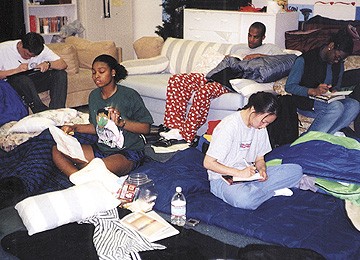
Lending a helping hand
Alternative Spring Break, sponsored by Mobilization of Volunteer Efforts gives students wishing to reach out to those in need the opportunity to spend their spring breaks those in need.
This year’s trips include six locations, such as Chattanooga, Tenn., where students can help with an environmental project on the Cumberland trails in the Appalachian Mountains. In Denver, Colo., students can help with a health care program by surveying homeless people and reading to children as they wait for doctors to see them. Students can also help inner city children in Kansas City, Mo., ex-felons in Albuquerque, N.M., or with refuge resettlement in Nashville, Tenn.
Each site accommodates 10 to 15 students, a site leader and a faculty advisor.
Anna Miller, a sophomore biological science major and campus chairwoman of Alternative Spring Break, believes that it’s rewarding for students to help out in this capacity.
“It gives them a chance to see another part of the country, while helping out the community at the same time,” Miller said. “It also gives students a chance to work with a diverse group of students that they might not normally have worked with on campus.”
Miller also went on Alternative Spring Break last year to Philadelphia, where her group helped the community by delivering meals to AIDS victims around the city.
“I was able to see first hand the families and children that are affected by AIDS and how the meals we were bringing them were essential for their survival,” Miller said.
Nadia Kamar, a junior anthropology major and vice president of MOVE said that this year’s trips offer students the opportunity to meet people, while changing their views of the world.
“The issues change each year,” Kamar said. “It’s never the same trips, it’s always something new and different. You can be at SMU for four years and in four years you can go on Alternative Spring Break and get a different experience each time.”
Kamar spent last year’s spring break helping with domestic violence issues on a Navajo reservation in Shiprock, N.M., and recommends the experience to anyone whose priority is community service.
“We want individuals, but we also want people who know how to work as a team and be part of a group,” Kamar said.
The cost of each trip, which includes transportation, meals, and housing, ranges from $190 to $350 and financial aid is available to those who qualify for it.
MOVE also sponsors events like Community Service Day and Habitat for Humanity every Saturday, as well as weekly projects that help students get more involved in the community while getting to know fellow classmates.
Students interested in going on Alternative Spring Break or helping out by becoming a site leader can pick up an application at the Community Involvement Office on the third floor of the Hughes-Trigg Student Center.








